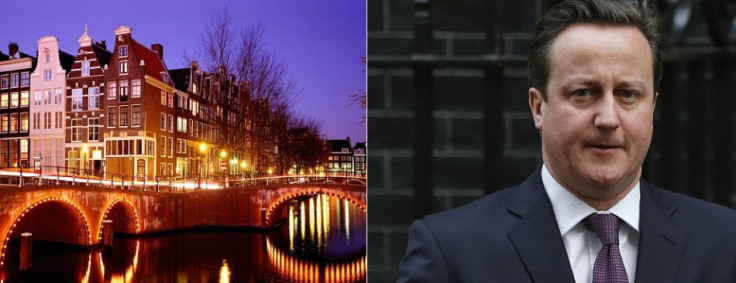Why Amsterdam? David Cameron Sets Scene for Historic Europe Speech

Chances are that the Dutch city of Amsterdam is not the most obvious choice for a keynote speech on the future for Britain and Europe.
But the capital famous for its very 'continental' attitude to sexuality and recreational drugs is precisely where David Cameron will deliver his big speech on Britain's position in the EU, on Friday.
And what he says could fundamentally shape how Britain trades and deals with neighbouring countries for decades to come.
Cameron is expected to outline the framework of a new relationship for the UK with Europe. He is also expected to unveil details of a referendum on Britain's European role.
His 9am address is expected to be keenly followed, with Europe lurching through a series of debt crises as the consensus grows among Eurozone states, that real recovery lies in closer union.
Meanwhile, in Britain, Cameron has been feeling the political heat from all sides. Eurosceptic Conservative backbenchers are demanding a new deal with Europe. Deputy PM Nick Clegg favours forging closer bonds. Meanwhile, Labour watches gleefully as the Tories get themselves in yet another funk over the EU.
So why has Cameron chosen Amsterdam for his big moment, rather than addressing his audience from London?
It has nothing to do with the sights, the city's lax laws on sex and drugs, or the bland food. The answer is that Cameron's choice of venue is purely political. Amsterdam is the location for his big speech because of its significance historically in Europe and as an ally today of Britain.
Cameron wants to make an impression by being seen to talk about Europe, to Europe, in Europe. Delivering his speech in the United Kingdom would look bad as it would strengthen the image of the UK as a "snarling bulldog across the water" - the powerful image used by the Tories' own leading MEP about Britain's increasing restlessness.
Picking the Netherlands sends out a message that Cameron's speech is significant, possibly even historic. The Netherlands was a founding member of the European project in 1957. Today, it is one of the few founding member countries in which Cameron can make his speech as the UK shares more common ground with its north European cousin than with the likes of France and Germany. Cameron's own opposition to a closer banking union are echoed by the Dutch government.
Downing Street told IBTimes UKthe prime wants to avoid 'Eurocrats' completely, hence his decision to spurn Brussells.
A spokesman said: "The PM wants to set out his views on the future of the European Union, how it needs to develop and Britain's relationship with it. He wants to speak to a broad European audience, not just of Eurocrats, but of business leaders and the wider public.
"The Netherlands is a great place to do that - a great historic and commercial European country, one of the EU's founding Member States, where there is a vigorous and open debate about how to achieve the kind of outward-looking , competitive EU we need."
Cameron presentation is key
Thinktank OpenEurope told IBTimes UK that how Cameron presents his case will be key.
Research director Stephen Booth said: "We would urge the prime minister to choose his words carefully and be clear that this is not special pleading by Britain but is a legitimate response.
"He should say we do believe in the single market and things like breaking down trade barriers but that we are not going to join the euro."
Booth added: "This is a debate which has been going on since [1992's] Maastricht Treaty, in which Britain got an opt-out clause. So this is a speech which has been long in coming.
"In Europe, we have now a club within a club. Until now we could pretend we were all in it together but now it is driving fundamental changes to how the countries interact with each other."
© Copyright IBTimes 2024. All rights reserved.






